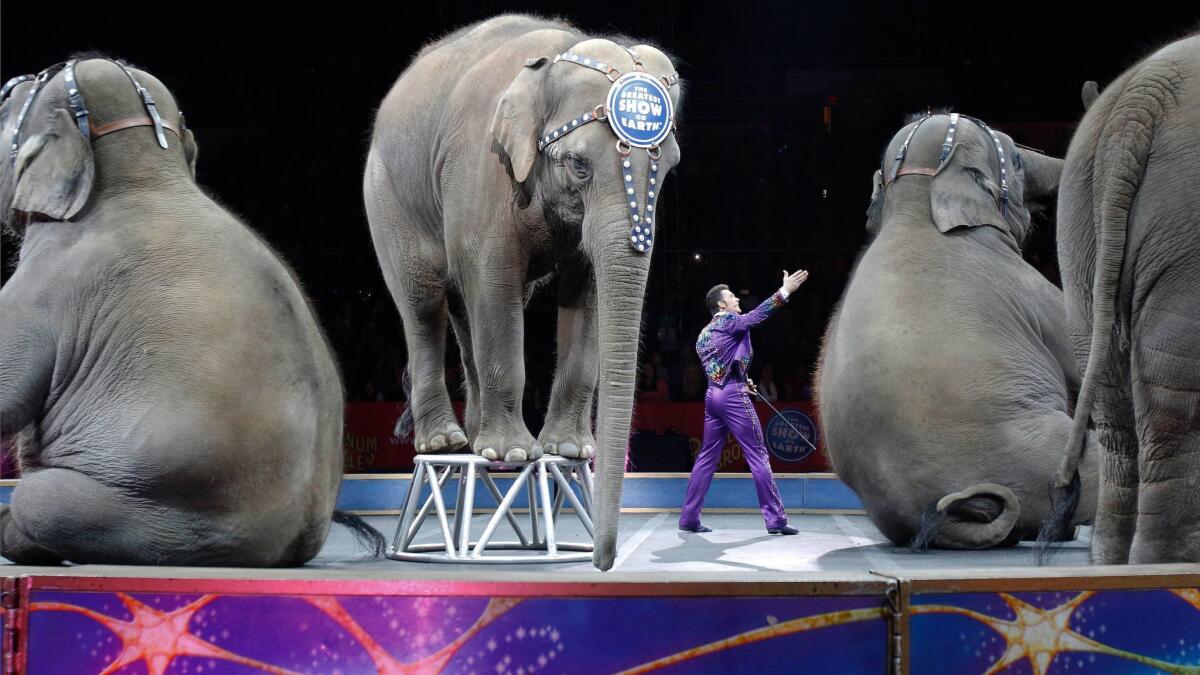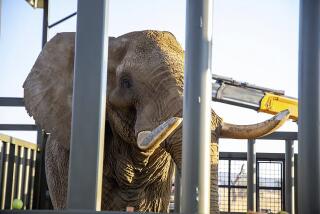Editorial: The Ringling Bros. circus folds its tent for good

- Share via
Maybe the circus was never the greatest show on earth, as its advertising exulted, but certainly, it was the most attention-grabbing attraction to roll (literally, by train) into American towns, big and small, for decades. Ringling Bros. and Barnum & Bailey’s circus embraced the more-is-more philosophy, delighting children, in particular, with a parade of exotic animals they had only dreamed of seeing up close. Tigers and lions that stalked the stage. A human cannonball who flew through the air. Clowns, acrobats and elephants that rose up on their hind legs. (Just the elephants, that is.)
But over the years, our understanding of wild animals and how they should be treated has evolved, especially in the wake of protests and lawsuits by animal welfare groups. Last May, Ringling retired its Asian elephants from show business to the company’s own conservation preserve in Florida. And this past weekend, Ringling officials announced that the circus will fold its tent for good after 146 years in business.
Kenneth Feld, the chief executive of Feld Entertainment which produces the circus, noted on the Ringling website that ticket sales had been declining for a while but dropped dramatically after the elephants left the show in May. (The show retooled itself and added new human acts but was still full of lions, tigers, alpacas, llamas, and dogs among other animal species.) But the drop in sales and high operating costs “made the circus an unsustainable business,” Feld wrote on the website.
There’s no question that it was time for the circus to retire its elephants — as this page had called upon them to do — just as it was time for SeaWorld to retire its killer whales and stop making them perform. Many animal welfare advocates believe that no wild animal should be used in an entertainment show.
For a decade, Ringling fought back against lawsuits and evidence from animal welfare groups and elephant experts that hauling elephants across the country in rail cars and using a sharp-edged tool called a bull hook to get them to perform constituted cruel treatment. Ringling always maintained that its elephants were treated with the utmost care, but public opinion had changed. Most zoos have nixed the use of bull hooks. Los Angeles was among the first cities to pass a bull hook ban — and the state of California did, as well, last year.
Had Ringling continued with its elephant act, it would not have been able to bring the circus to any venue in California.
It’s unfortunate, even a bit surprising, that Ringling, which has been enterprising enough to stay in business for more than a century, could not transform its circus into an elephant-free entertainment feature that could thrive in a world of children — and adults — accustomed to warp-speed cyber amusement. Still, Ringling had little choice and did the right thing in retiring its elephants last year, even if it contributed to the show not going on.
Follow the Opinion section on Twitter @latimesopinion and Facebook
More to Read
A cure for the common opinion
Get thought-provoking perspectives with our weekly newsletter.
You may occasionally receive promotional content from the Los Angeles Times.










